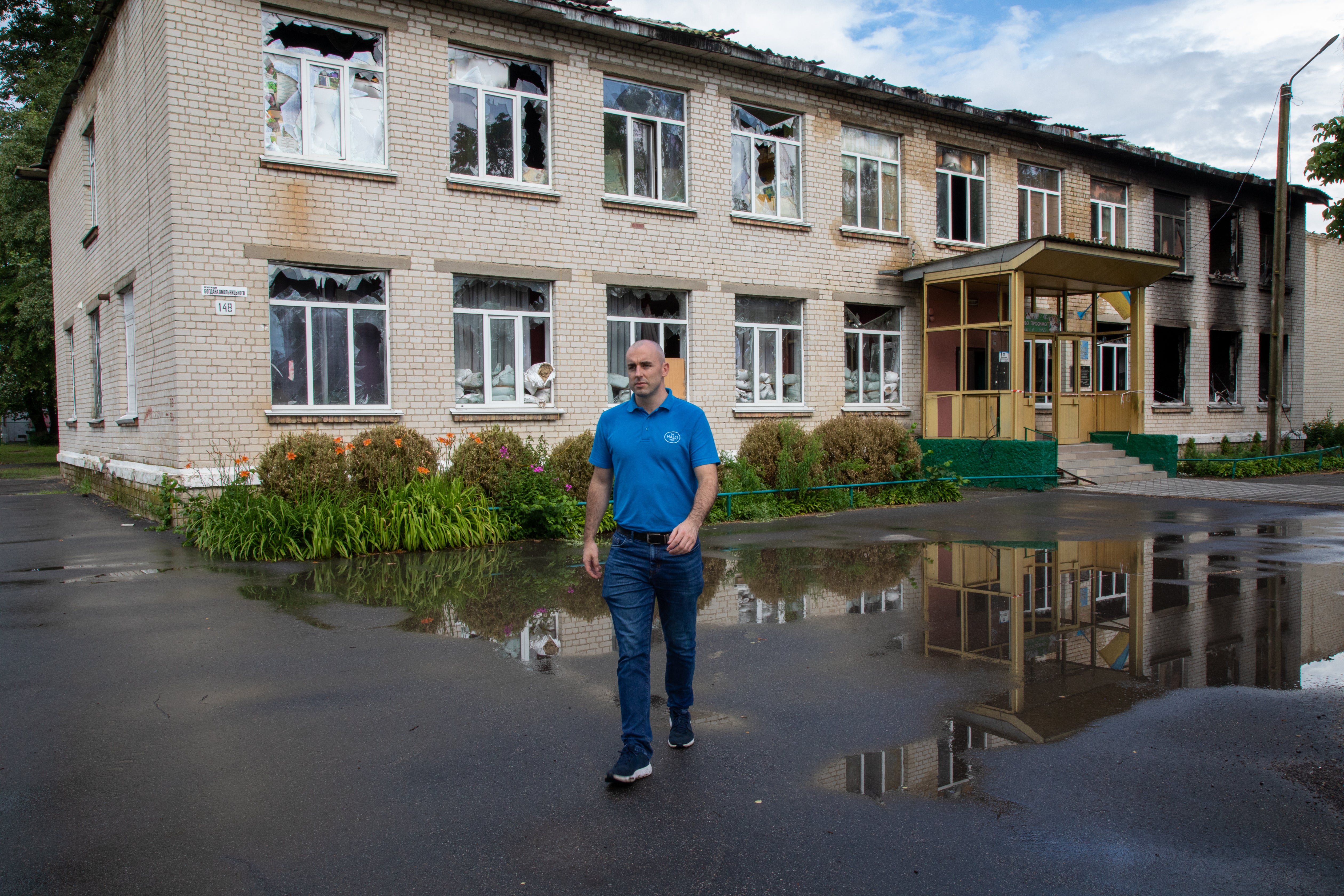Scottish goalkeeper swaps saving shots on the pitch for lives in Ukraine
Kieran McCulloch works for the Halo Trust, a leading humanitarian landmine clearance charity.

A Scots goalkeeper has spoken about putting football on hold to go and save lives in Ukraine with demining charity the Halo Trust.
Kieran McCulloch, 30, missed the end of last season with West of Scotland League side Threave Rovers because his day job as a logistics and procurement officer for the non-profit organisation took him to war-torn Ukraine.
The Halo Trust, a Scottish charity, with its headquarters based in Thornhill, near Dumfries, is ridding areas around the country’s capital Kyiv of deadly explosive devices.
Mr McCulloch’s role involves supporting the charity’s team of 400 Ukrainian deminers by overseeing the supply of vital equipment including metal detectors, bullet-proof vests, and armoured vehicles.
“As strange as it sounds, I actually find football’s probably a lot more stressful,” Mr McCulloch said, who had never been in a live war-zone until this year.
“If you’ve got the manager or the crowd screaming and bawling at you because you’ve not caught the ball properly, I find that more stressful than when an airstrike is coming.
“If you make one mistake in goals then your team is 1-0 down and there’s absolutely no hiding place.
“As a goalkeeper, your job is to get in the way of shots, but when I’m out working with Halo in places like Ukraine, it’s the total opposite.”
Despite his positive attitude, Mr McCulloch, from Dumfries, revealed it was impossible to avoid the horrors of war while in Ukraine.
“When we were working in Vinnytsia, about 170 miles from Kyiv, three Russian missiles hit the centre of the city just a couple of kilometres from where we were based.
“The attack killed 30 or 40 people.”
The keeper, who has worked for the charity in Somalia, Armenia and the West Bank, has been to Ukraine with Halo twice this year so far.
Speaking about his first trip, he described driving through Irpin, on the outskirts of Kyiv, like “a full-on war zone”.
“To see buildings burned to a crisp and the scale of that devastation with your own eyes is really shocking,” he added.
“It could have been any street or retail park in Scotland except everything was burnt out.
“It’s just luck of the draw for these people whether their home was blown up.
“We employ around 400 Ukrainian staff and a lot of them have lost their homes or loved ones, but they continue coming to work to make their country better.
“They are the real heroes.”
The Scot goes on to say that his work abroad can be tough on his family and friends back home.
“My girlfriend and parents obviously have that worry about me being in Ukraine because they see the worst of everything in the news, but we are nowhere near the worst of the fighting in the east,” he said.
“I tried to send them pictures of me doing normal things like going to the supermarket and things like that just to help calm their nerves a wee bit.
“Now I’ve survived a couple of trips, they are relaxing a little, but I suppose it’s only natural for your loved ones to worry.”
He added: “My job with Halo can be stressful and Ukraine has been full-on, but it’s rewarding because you are helping make peoples’ lives safer.”
After returning from his second deployment to Ukraine about a week ago, the footballer now hopes to win back the No1 jersey for Castle Douglas-based Threave Rovers, who play in the West of Scotland league fourth division.
Mr McCulloch said: “When I was out in Ukraine in May, the manager Vinnie Parker actually had to come out of retirement and get his gloves back on to play because our other goalie was also unavailable.
“It’s an unusual selection issue for a manager that one of your players is out in a war zone but everyone at the club has been 100% supportive.”
Halo has been working in eastern Ukraine since 2016.
The charity, which is also working on educating civilians, especially children, about the risk of landmines, has received £2 million in funding to support its life-saving work from the UK Government’s Foreign, Commonwealth & Development Office.
Minister for Europe Graham Stuart said: “Kieran McCulloch has swapped saving shots to play a crucial role saving lives in Ukraine and the UK Government is proud to be supporting The Halo Trust’s world-leading demining work.
“The UK stands in solidarity with Ukraine against Putin’s illegal and inhumane war by pooling expertise from across Britain to make a real difference through our £220 million humanitarian aid response.
“People from Scotland, England, Wales and Northern Ireland stand behind international support for Ukraine in its fight against (Vladimir) Putin’s illegal and inhumane war.”
HALO operates in almost 30 conflicted-affected countries and spends around £3 million a year on training.
Bookmark popover
Removed from bookmarks